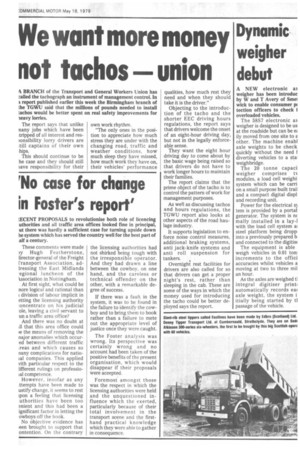N o case for change
Page 7

If you've noticed an error in this article please click here to report it so we can fix it.
in Foster's report'
LECENT PROPOSALS to revolutionise both role of licencing uthorities and all traffic area offices looked fine in principal, .ut there was hardly a sufficient case for turning upside down tie system which has served the country well for the best part of .alf a century.
These comments were made )y Hugh Featherstone, iirector-general of the Freight Cransport Association, adiressing the East Midlands .egional luncheon of the kssociation in Nottingham.
At first sight, what could be nore logical and rational than division of labour implicit in etting the licensing authority :oncentrate on his judicial .ole, leaving a civil servant to un a traffic area office?
And there was no doubt at LII that this area office could ie the means of removing the najor anomalies which occured between different traffic Lreas and which causes so nany complications for natio'al companies. This applied vith particular respect to the lifferent rulings on professioial competence.
However, insofar as any .ttempts have been made to ustify change, it seems to rest ipon a feeling that licensing .uthorities have been too enient and this had been a ignificant factor in letting the owboys off the hook.
No objective evidence has peen brought to support that ontention. On the contrary the licensing authorities had not shirked being tough with the irresponsible operator. And they had drawn a line between the cowboy, on one hand, and the careless or technical offender on the other, with a remarkable degree of success.
If there was a fault in the system, it was to be found in the failure to identify the cowboy and to bring them to book rather than a failure to mete out the appropriate level of justice once they were caught.
The Foster analysis was wrong. Its perspective was certainly wrong and no account had been taken of the positive benefits of the present organisation, which would disappear if their proposals were aceepted.
Foremost amongst those was the respect in which the licensing authorities were held and the unquestioned influence which the exerted, particularly because of their total involvement in the transport scene and the firsthand practical knowledge which they were able to gather in consequence.




















































































































